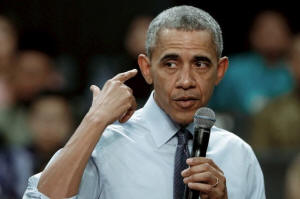|
 Obama
defends TPP secrecy, says now is chance for debate Obama
defends TPP secrecy, says now is chance for debate
 Send a link to a friend
Send a link to a friend
[November 20, 2015]
By Matt Spetalnick
KUALA LUMPUR (Reuters) - U.S. President
Barack Obama launched a defense on Friday of a signature Pacific trade
pact kept largely under wraps and said the public would get its say
before legislators in each country debate the full details.
|
|
 The Trans-Pacific Partnership (TPP), a "mega-regional accord"
covering four-tenths of global GDP, was so complex it would not have
materialized if all interest groups were involved in the protracted
talks, he said. The Trans-Pacific Partnership (TPP), a "mega-regional accord"
covering four-tenths of global GDP, was so complex it would not have
materialized if all interest groups were involved in the protracted
talks, he said.
"If you are negotiating with 12 countries and there's no space for
everyone to agree on the deal ... then it would never get done,"
Obama said during a town hall at a Kuala Lumpur University.
"The nature of the trade agreement is so many interests are
involved, so what we've done instead is close the initial deal, it's
subject to review .... each country then has to ratify and it's
subject to the legislatures."
Obama was responding to a question from a Malaysian youth who said
the TPP was elitist and excluded most voices.
 Barring occasional leaks, details of the TPP have been kept secret
during the more than five years of negotiations, angering those
affected by its broad implications.
"I still have to get it past Congress," Obama added. "I believe it's
a good deal and we'll get it done, but there's no guarantee."
The pact could come up against some opposition in Washington. Obama
has long championed the deal but needs to muster support among
moderates to ensure ratification.
He recently said it would allow the United States to "write the
rules of the road" for 21st century trade, but warned: "If America
doesn't write those rules, then countries like China will." The
pact covers countries from Japan, Canada and Australia to Mexico,
Vietnam and Malaysia and would slash tariffs between them and set
common standards on issues ranging from workers' rights to
intellectual property protection.
[to top of second column] |

Obama used the U.S. pharmaceutical industry as an example of
resistance and how concessions needed to be made.
"We were very specific in the chapter to say that we have to protect
generics for low income persons," he said.
"Here's proof that this wasn't just some giveaway to the drugs
companies. Right now a lot of drugs companies in the United States
are mad at me because they said 'how come we didn't get more
protection?'
"Well, part of our job is to promote the U.S. drug industry but part
of our job is also to be good partners with countries that have
people who are sick."
(Reporting by Matt Spetalnick; Writing by Martin Petty; Editing by
Nick Macfie)
[© 2015 Thomson Reuters. All rights
reserved.]
Copyright 2015 Reuters. All rights reserved. This material may not be published,
broadcast, rewritten or redistributed.
 |